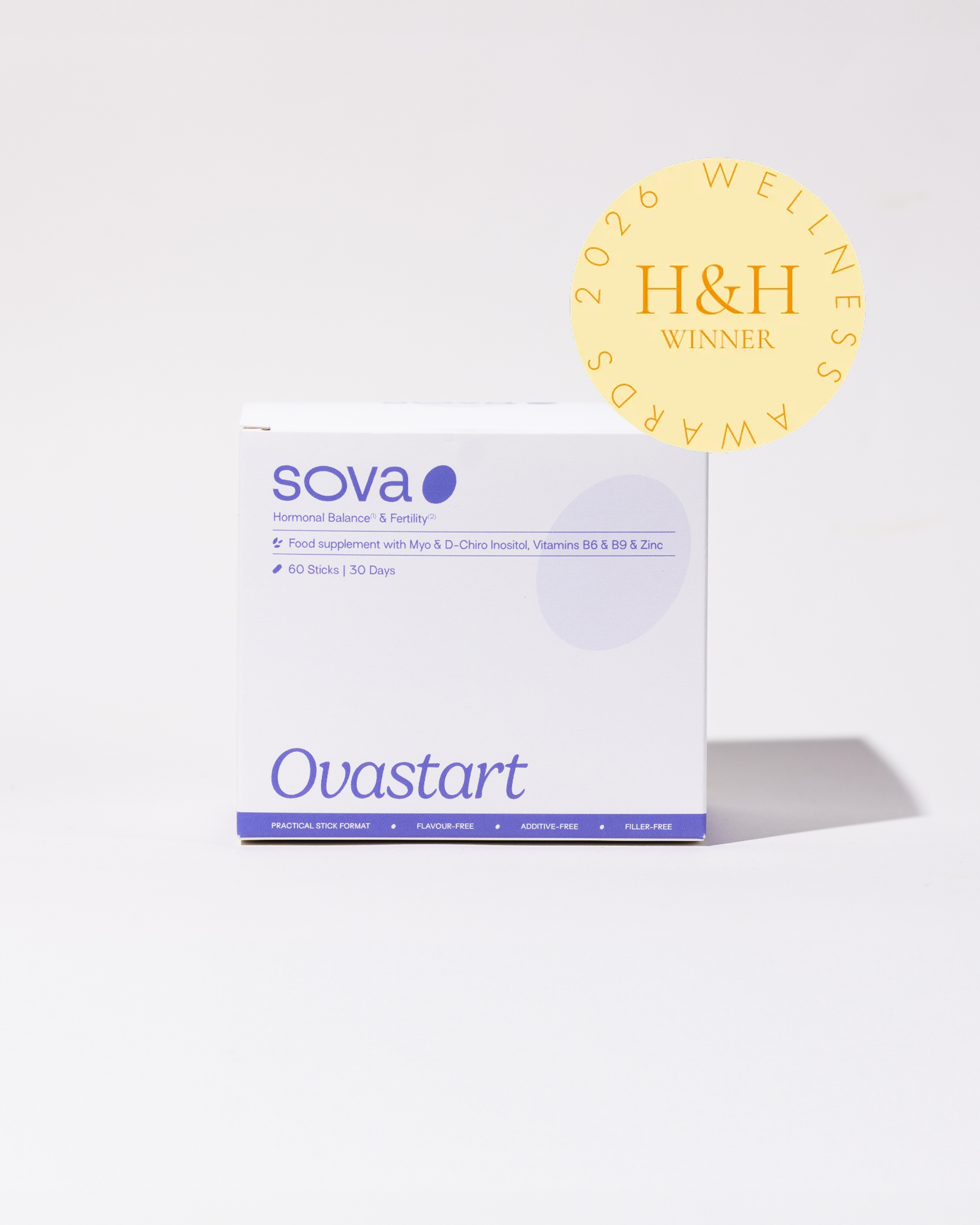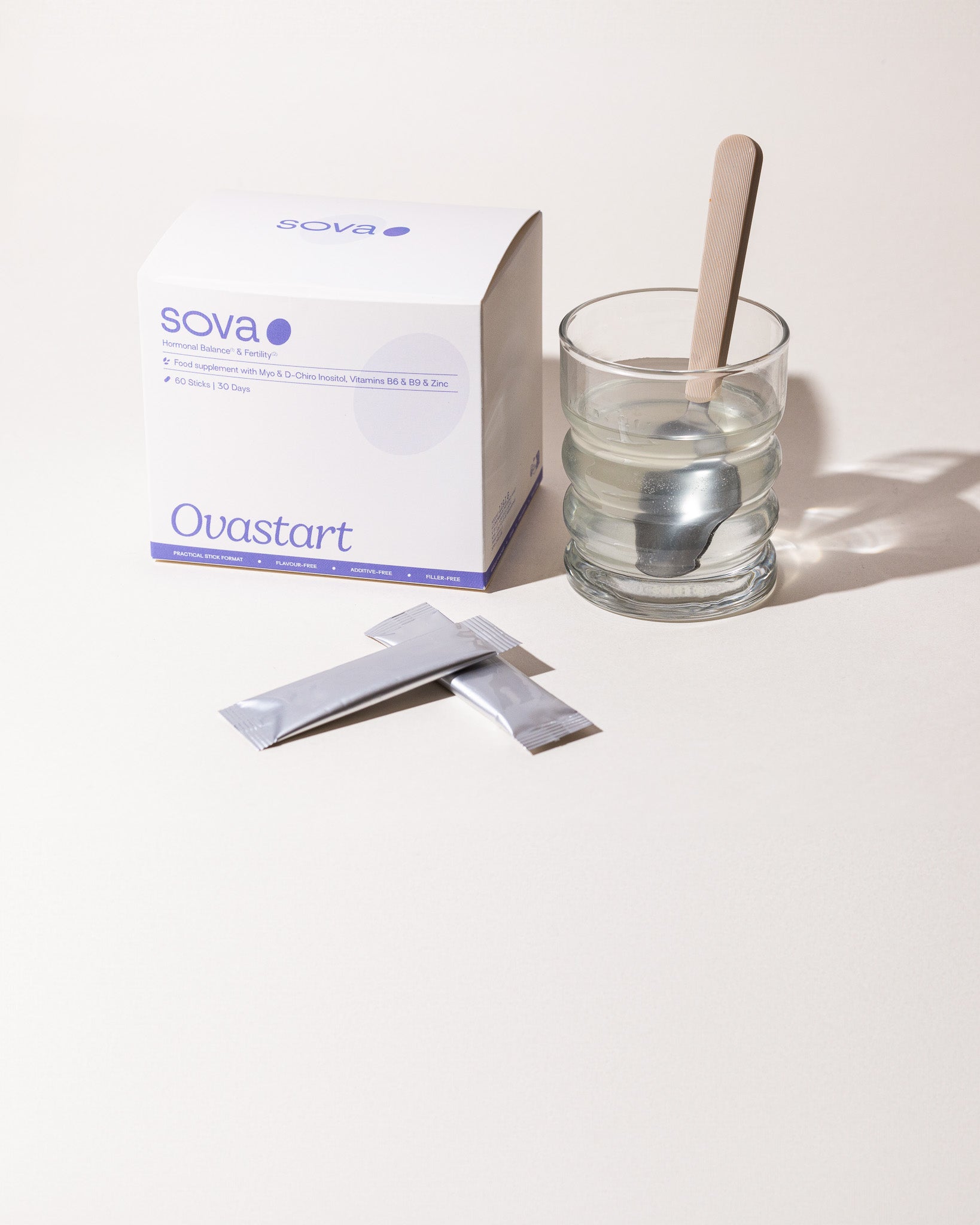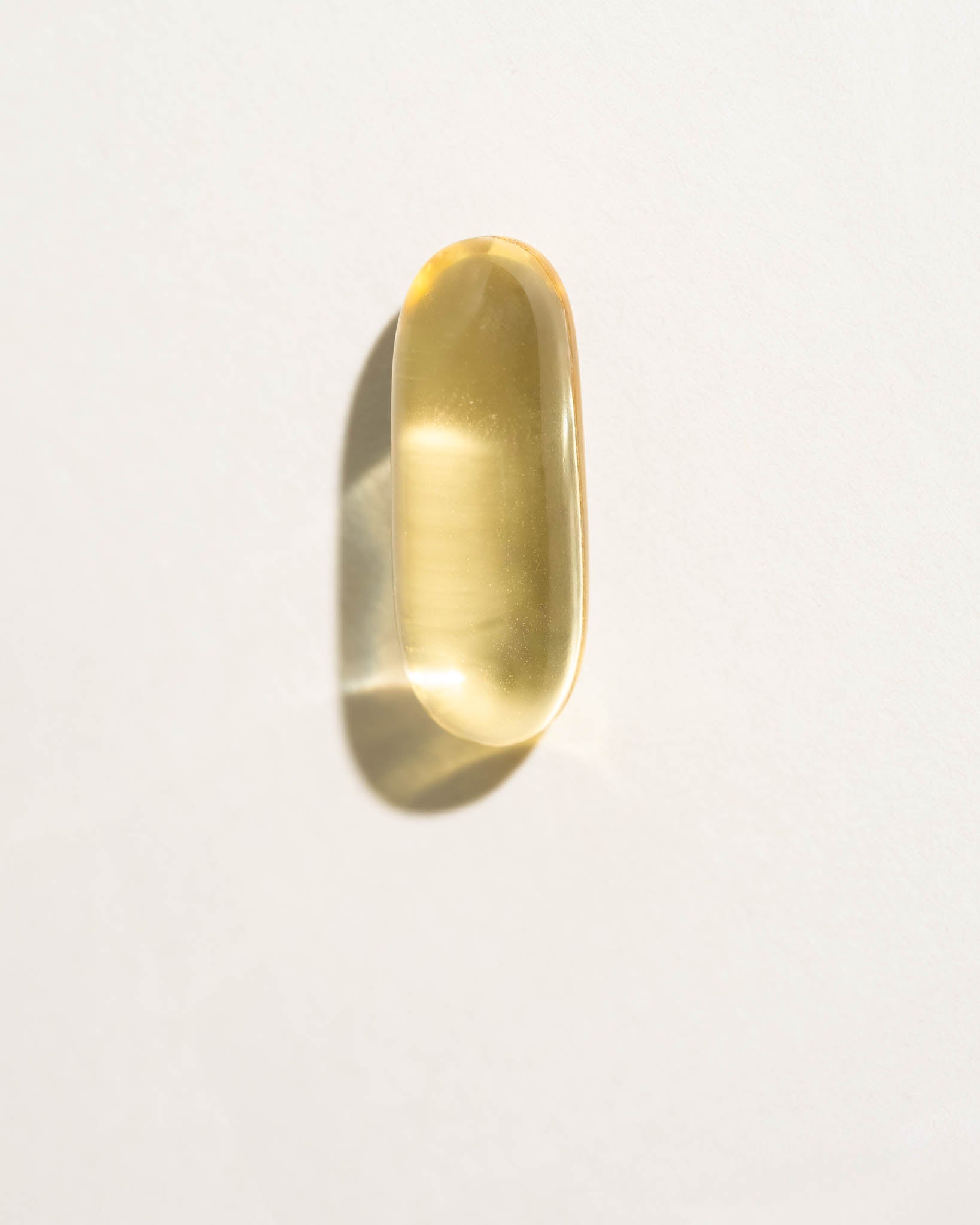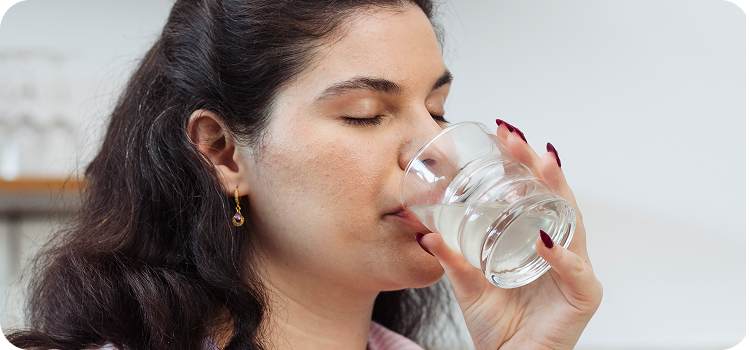Table of contents
In cases of Polycystic Ovary Syndrome (PCOS), the most common signs that alert women are irregular cycles or the complete absence of menstruation. If you’re reading this, it's likely these symptoms have led you to seek help.
Whether it’s after stopping hormonal contraception or during puberty, you’ve soon realised that not having your periods isn’t quite right. You might have found it convenient at first because periods aren’t always comfortable, but if you’re here, you’re probably hoping to restore everything to its proper state—and most importantly, to have your period every month.
Why don't you have your periods with PCOS?
To get straight to the point, you’re not having your periods because you’re not ovulating. While the explanation is straightforward, it warrants further detail so you can understand what steps you might take to regain your periods with PCOS.
Absence of periods: causes to rule out
PCOS is not the only condition that can cause the cessation of menstruation. Essential or primary amenorrhea refers to the absence of periods at puberty, while secondary amenorrhea refers to the onset of periods followed by their disappearance.
Here, we’ll focus on causes that might lead to secondary amenorrhea and which are worth ruling out before addressing your PCOS symptoms.
-
Hypothalamic Dysfunction: The hypothalamus, the command centre for your hormones, might not function properly due to stress, intense activity (such as high-level sports), poor nutrition (eating disorders), or mental health issues (depression).
-
Primary Ovarian Insufficiency: Premature menopause.
-
Pituitary Dysfunction: Caused by head trauma, elevated prolactin levels, or a pituitary adenoma.
-
Thyroid Dysfunction: Both hyperthyroidism and hypothyroidism.
-
Use of Certain Medications: Such as antidepressants and antipsychotics.
To rule out these causes and conduct the necessary tests, we recommend consulting a healthcare professional.
Hyperandrogenism and its effects on the menstrual cycle
Ovulation disturbances can have various origins, but in the case of PCOS, they are generally linked to hyperandrogenism. Hyperandrogenism occurs when your body produces excessive amounts of androgens, also known as “male” hormones. Testosterone is an androgen, but others include androstenedione and DHEAS.
This excess of androgens leads to the following symptoms:
-
Long or irregular cycles;
-
Absence of periods;
-
Inflammatory acne;
-
Hirsutism (excessive hair growth);
-
Androgenic alopecia (hair loss);
-
Polycystic ovaries;
-
Insulin resistance.
It’s important to note that androgens are naturally produced by your ovaries and adrenal glands (small glands above the kidneys), but PCOS exacerbates their production. There are three main reasons for this:
-
Insulin resistance and/or hyperglycemia caused by PCOS, which stimulates androgen production.
-
Chronic low-grade inflammation induced by excessive androgens, insulin resistance, and/or hyperglycaemia.
-
Elevated LH levels related to the overproduction of androgens, which perpetuates the hormonal imbalance.
These three factors disrupt your menstrual cycle and frequently inhibit ovulation, leading to long, irregular cycles or a complete absence of periods.
Additional factors that can exacerbate this existing imbalance include stress, which can stimulate adrenal glands and increase androgen production, and factors such as diet, smoking, alcohol, high-intensity exercise, and lack of sleep, which can further intensify chronic low-grade inflammation and insulin resistance.
The absence of ovulation: a major event in the menstrual cycle
Ovulation is crucial as it determines the production of your hormones (oestrogens and progesterone), making it the major event of the menstrual cycle. Without ovulation, your hormonal balance is disrupted. You won’t produce progesterone, which is essential for mental health, sleep, skin, muscle, and bone health.
For ovulation to occur, the following conditions must be met:
-
Produce sufficient oestrogens.
-
Maintain a balanced FSH/LH ratio: LH triggers ovulation; if it’s significantly higher than FSH, it will inhibit ovulation.
-
Have balanced hormonal levels : including androgens, blood sugar, progesterone, thyroid hormones, and prolactin.
-
Protect your body from “survival mode” that may be triggered by intense physical or psychological stress. This “survival mode” helps your body avoid potential pregnancy, which requires substantial energy, by limiting sex hormone production. For example, women experiencing war or famine often stop menstruating. Nowadays, stress, alcohol, lack of sleep, inadequate nutrition, or overtraining can activate this “survival mode.”

How to stimulate ovulation?
As you’ve gathered, many factors can disrupt your ovulation, but the good news is there are numerous solutions to help get it back on track. However, the solutions we’ll discuss focus on lifestyle adjustments and should not replace medical intervention. We advise consulting a healthcare professional, particularly in cases of prolonged amenorrhea (> 6 months). Our suggestions can complement and optimise your medical care.
Lifestyle and PCOS: Where to start?
Many are unsure where to begin when it comes to altering lifestyle habits to improve PCOS symptoms. We suggest considering the following questions to assess and potentially identify areas for improvement. The goal is to review and identify what can be changed to enhance your quality of life.
-
In which areas of your life can you easily modify your habits? (diet, exercise, stress management, dietary supplements).
-
In which areas do you struggle, and who can help you with that? (doctor, midwife, psychologist, endocrinologist, naturopath, osteopath, etc.).
-
What changes can you make to improve your quality of life without incurring costs?
-
If you’ve had a blood test, what were the results? (high insulin resistance, elevated stress hormones, etc.).
These considerations will help you prioritise your actions and create a coherent plan to enhance your health and restore your periods.
Reducing the levels of androgen hormones
To lower your levels of male hormones, you need to address factors that exacerbate hyperandrogenism: insulin resistance, hyperglycemia, inflammation, and oxidative stress.
There are several approaches to tackle these issues:
-
Diet: A low glycaemic index diet rich in proteins, complex carbohydrates, and healthy fats can reduce insulin resistance and stabilise blood sugar levels. Anti-inflammatory omega-3-rich fats, in particular, and an overall anti-inflammatory diet can reduce insulin resistance, androgen production, and general inflammation. Omega-3s also lower total cholesterol and triglycerides in women with PCOS. (1). For more details, check out our article: Nutrition and PCOS: The key rules of a diet adapted to your type of PCOS.
-
Exercise: Regular exercise improves insulin resistance, lowers hyperglycaemia, and reduces the risk of cardiovascular diseases associated with PCOS. It also benefits mental health when done approximately 2 hours per week. (2). Interested in knowing more? Check out our article on PCOS and Exercise.
-
Digestive Health: Supporting your digestion and microbiome can also help stabilise blood sugar levels. Several studies have shown that dysbiosis (microbiome imbalance) increases insulin resistance, blood sugar levels, and inflammation. (3)
-
Stress Management: Stress exacerbates inflammation, which is associated with PCOS. (4) If you have an anxious or stressed temperament and feel quickly overwhelmed, it’s advisable to work on this to balance your hormones and encourage the return of ovulation and periods. Learn more on our dedicated article.
-
Sleep: Poor-quality sleep exacerbates memory issues, fatigue, anxiety, inflammation, and blood sugar fluctuations. (5) Sleep apnoea is a common sleep disorder in women with PCOS. If you suspect you have it, consult for diagnosis and appropriate solutions. For insomnia, awakenings, or unrefreshing sleep, consider adjusting your bedtime routine (less screen time, relaxation, lighter meals).
-
Dietary Supplements: Numerous supplements are available, with Inositol, omega-3s, magnesium, zinc, and vitamin D being particularly notable. We’ll delve into these in the following section.
What supplements and medications can help you get your periods back?
To get your periods back, it is often beneficial, and sometimes even necessary, to give your body a helping hand. The use of hormonal contraception, exposure to endocrine disruptors, nutrient depletion in soils, or even stress can lead to vitamin and mineral deficiencies.
Micronutrition
D-chiro-inositol combined with Myo-inositol helps to lower insulin levels, androgen hormones, and the HOMA index. This combination also increases SHBG (Sex Hormone Binding Globulin) levels, which helps regulate and balance your hormones. Additional studies have shown that myo-inositol supplementation improves ovulation rates and menstrual cycle frequency. (6)
👉 These two nutrients are found in our supplement, Ovastart, combined with zinc.
Zinc reduces insulin resistance, total cholesterol, and triglyceride levels. It also helps to decrease androgen hormones that disrupt ovulation in women with PCOS. This micronutrient is an excellent antioxidant that promotes ovulation and helps regulate the menstrual cycle. (7)
Vitamin D is particularly important for women with PCOS, as about 70% of them are deficient in it. Vitamin D encourages ovulation, lowers testosterone and LH levels, and improves insulin resistance. (8)
Omega-3 fatty acids help reduce insulin resistance as well as cholesterol and triglyceride levels. A six-month Omega-3 supplementation can lead to more regular periods, likely due to a reduction in testosterone levels. (10)
Magnesium reduces anxiety and modulates the hypothalamic-pituitary axis, which, under the influence of stress, can disrupt your hormonal balance and block ovulation. (11) If you often feel stressed and anxious, you might want to start with this supplement, which is easy to take.
Herbal Medicine and Gemmotherapy
Certain plants can support hormonal balance and naturally encourage the return of ovulation.
Shatavari, a well-known herb in Ayurvedic medicine, may help regulate hormones affected by stress. In one study, an Ayurvedic treatment containing Shatavari led to conception within three months in 62% of women with PCOS and fertility issues. This suggests a potential role in supporting ovulation and the return of periods. (12)
Fenugreek, when taken consistently over three months, may reduce ovarian volume, decrease the number of follicles, and rebalance the LH/FSH ratio — all of which can contribute to more regular menstrual cycles. (13)
Raspberry bud extract acts as a hormone regulator by supporting the balance of oestrogen and progesterone. Often used in gemmotherapy, it may help address hormonal disorders such as PCOS, reduce symptoms like hirsutism, and support ovulation by acting on the hypothalamic-pituitary axis — the body’s hormonal command centre. It’s typically taken for three weeks per month at a dose of five drops, three times a day. However, it is not recommended for individuals with hormone-dependent cancers.
Medical Solutions
In some cases, lifestyle changes and supplements may not be enough on their own. Medical treatments can offer additional support, especially when ovulation is severely disrupted.
Antidiabetic medications – Originally designed for type 2 diabetes, these drugs are sometimes prescribed to women with PCOS to improve insulin sensitivity. By reducing insulin resistance, they can help restore hormonal balance, encourage ovulation, and support the return of regular periods.
Ovulation-inducing treatments – These medications are typically used as part of fertility treatments. They work by stimulating the ovaries to release an egg and are generally prescribed when there is a desire to conceive. (14)
How do you know you have genuine periods?
Your periods may occur with some regularity, such as every two months, without ovulation taking place: this is known as withdrawal bleeding. Your body essentially resets in an attempt to ovulate again.
This is a normal and quite common process in women with PCOS, and you may go through this phase before regaining ovulation and a regular cycle.
To determine if your period is genuine, you need to ascertain whether you have ovulated or not. For this, we recommend observing your cycle using the symptothermal method.
Taking Your Time and Getting Support
Getting your periods back may take time as many factors come into play: insulin resistance, hyperandrogenism, inflammation, stress.
Give yourself time to gradually change your habits and reach this goal. If you find it difficult, don't hesitate to seek help and get support in this process!
👉 There’s no one-size-fits-all solution — that’s why we created the PCOS quiz to help you find what fits you best. And if you're looking for effective support, you can explore our full range of supplements here.
- Amenorrhea: Absence of menstruation for several months. In PCOS, this is often due to a lack of ovulation. = Amenorrhea: Absence of menstruation for several months. In PCOS, this is often due to a lack of ovulation.
- Anovulation: When the ovaries do not release an egg during a menstrual cycle. Without ovulation, periods can become irregular or disappear. = Anovulation: When the ovaries do not release an egg during a menstrual cycle. Without ovulation, periods can become irregular or disappear.
- Withdrawal bleeding: Bleeding that occurs due to hormonal fluctuations (for example after stopping the pill) even if no ovulation has taken place. It can be mistaken for a true period. = Withdrawal bleeding: Bleeding that occurs due to hormonal fluctuations (for example after stopping the pill) even if no ovulation has taken place. It can be mistaken for a true period.
- Hormonal imbalance: A disruption in hormone levels (such as androgens, insulin, or progesterone) that affects the menstrual cycle, ovulation, skin, hair, and metabolism. = Hormonal imbalance: A disruption in hormone levels (such as androgens, insulin, or progesterone) that affects the menstrual cycle, ovulation, skin, hair, and metabolism.
- Androgens: “Male” hormones also present in women. Higher levels can contribute to acne, hair growth, hair loss and irregular cycles in PCOS. = Androgens: “Male” hormones also present in women. Higher levels can contribute to acne, hair growth, hair loss and irregular cycles in PCOS.
- Insulin resistance: When cells become less responsive to insulin, causing the body to produce more of it. This affects hormones and ovulation, and is common in PCOS. = Insulin resistance: When cells become less responsive to insulin, causing the body to produce more of it. This affects hormones and ovulation, and is common in PCOS.
- Hypothalamic–pituitary–ovarian (HPO) axis: The communication system between the brain and ovaries that regulates ovulation and menstrual cycles. Stress, under-eating, or hormonal issues can disrupt it. = Hypothalamic–pituitary–ovarian (HPO) axis: The communication system between the brain and ovaries that regulates ovulation and menstrual cycles. Stress, under-eating, or hormonal issues can disrupt it.
- Thyroid dysfunction: When the thyroid gland produces too much or too little hormone. It can also lead to absent or irregular periods. = Thyroid dysfunction: When the thyroid gland produces too much or too little hormone. It can also lead to absent or irregular periods.
- Secondary amenorrhea: When someone who previously had regular periods stops menstruating for 3 to 6 months. = Secondary amenorrhea: When someone who previously had regular periods stops menstruating for 3 to 6 months.
- Cervical mucus: Fluid produced by the cervix. Changes in mucus texture can signal ovulation and are often used in natural cycle tracking. = Cervical mucus: Fluid produced by the cervix. Changes in mucus texture can signal ovulation and are often used in natural cycle tracking.
- Symptothermal tracking: A method of tracking ovulation by combining several signs: temperature, cervical mucus, and cycle changes. = Symptothermal tracking: A method of tracking ovulation by combining several signs: temperature, cervical mucus, and cycle changes.
Scientific references
SOVA was created by two sisters with PCOS who wanted products that truly worked. Our formulas are developed in-house with women’s health and micronutrition experts, using ingredients backed by clinical studies and compliant with European regulations.
- Built by women with PCOS, we know the reality of the symptoms.
- Clinically studied, high-quality ingredients, including patented forms like Quatrefolic® and an optimal Myo-/D-Chiro Inositol ratio.
- Holistic support for hormonal balance, metabolic health, inflammation, mood and cycle regulation.
- Transparent, science-led formulas with no unnecessary additives.




















